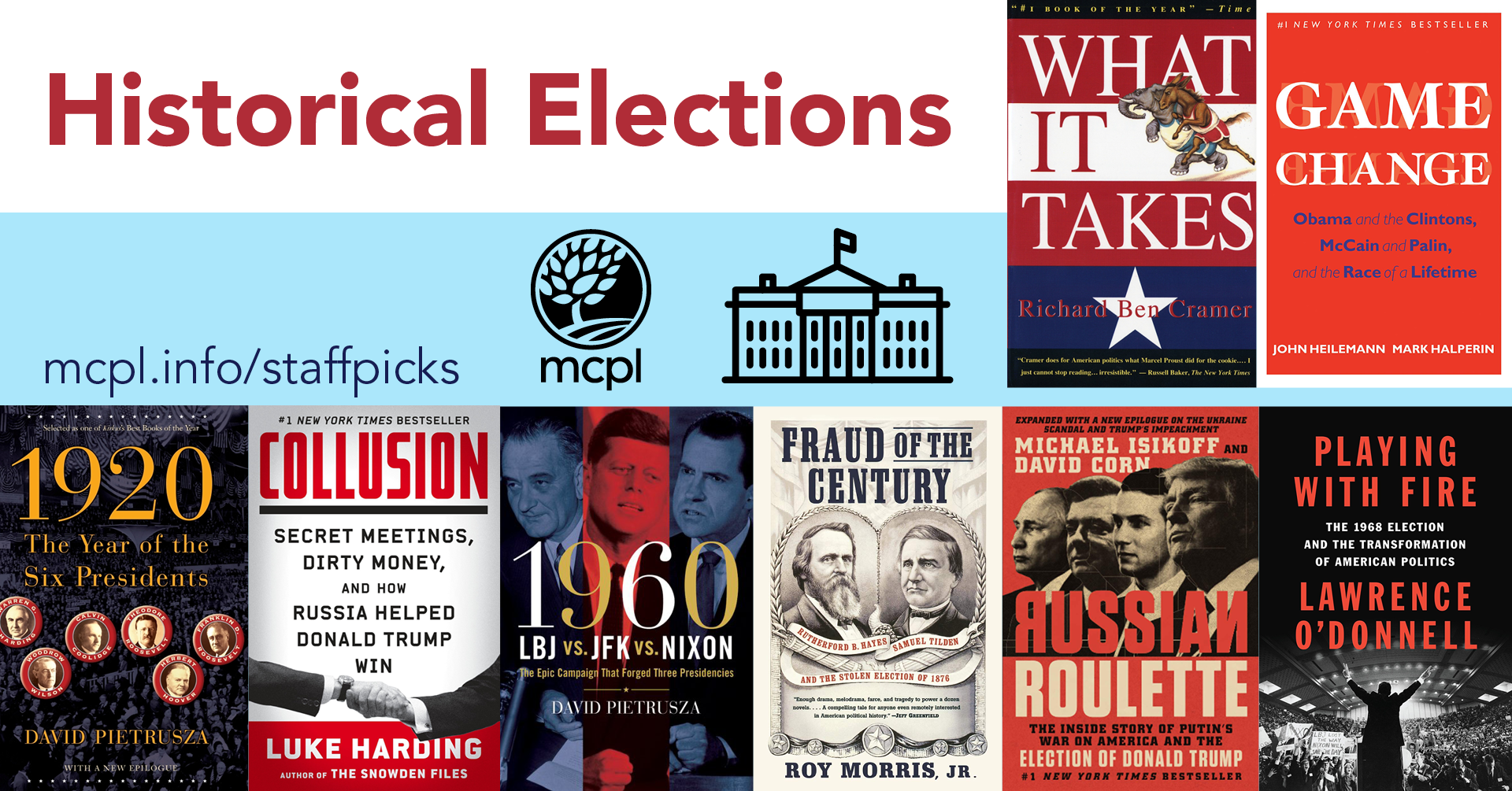Get ready to vote with some books about past elections. Learn about the stolen election of 1876, or discover how the 1968 election transformed the landscape of American politics. Then make your decisions about our current elections and get out and vote!
This is a chronicle and fascinating episode of American history is set during the time of Prohibition, women’s suffrage, civil rights, the League of Nations and post-World War I. Including a cast of characters that includes Eugene Debs, Hiram Johnson, Alfred E. Smith, and William Jennings Bryan, Pietrusza’s book spans the administrations of Teddy Roosevelt through Woodrow Wilson.
Three Presidents, three giants--one election. A thousand secrets. Round One of 1960's electrifying presidential contest pits charismatic upstart John Kennedy's blend of Harvard eloquence, social register style, and dashing vigor against molasses-drawl Senate power broker Lyndon's Johnson mercurial mix of overbearing Texas bluster and maddening indecision. Kennedy versus Johnson--the cool patrician versus the manic cowboy. Round Two pits JFK--dashing yet flawed in ways kept carefully hidden for an adoring public--head-to-head, down-to-the wire, against lone-wolf Richard Nixon's brooding, ultimately-damned, quest for political power and personal validation.
The Guardian foreign correspondent, Luke Harding has logged considerable time in Russia as a foreign reporter. In this fast-paced narrative, Harding takes the reader through the efforts of Donald Trump and his campaign circle to gain influence and the election.
Morris recreates in detail the presidential election that perverted the rule of law and almost rekindled the Civil War. The election pitted Hayes, an affable born politician and bona fide war hear against Tilden, a bookish lifelong bachelor barrister who once dropped out of Yale because he didn’t like the food.
From Amazon reviews: In Game Change, John Heilemann and Mark Halperin pull back the curtain on the Obama, Clinton, McCain, and Palin campaigns. Based on hundreds of interviews with the people who lived the story, Game Change is a reportorial tour de force that reads like a fast-paced novel.
Kirkus Reviews calls this book, “an excellent account of the 1968 presidential election, a political season of spoilers, outsiders, and broken machines eerily like our own time and compares favorably to Theodore H. White’s president’s series.
The presidential election of 1896 is widely acknowledged as one of only a few that brought about fundamental realignments in American politics. New voting patterns replaced old, a new majority party came to power, and national policies shifted to reflect new realities. R. Hal Williams now presents the first study of that campaign in nearly fifty years, offering fresh interpretations on the victory of Republican William McKinley over Democrat William Jennings Bryan.
An earlier account of Russia’s influence in the campaign of Donald Trump and their hacking of the 2016 election. As Kirkus Reviews quotes the authors, “’Never bore had a president’s election been so closely linked to the intervention of a foreign power.’”
An in-depth dissection of Hillary Clinton’s second campaign for the president, Kirkus Reviews says that this book is a “top-notch campaign examination” and that it will leave you wondering what on the earth happened in November 2016.
What It Takes penetrates the mystery at the heart of all presidential campaigns: How do presumably ordinary people acquire that mixture of ambition, stamina, and pure shamelessness that makes a true candidate? As he recounts the frenzied course of the 1988 presidential race -- and scours the psyches of contenders from George Bush and Robert Dole to Michael Dukakis and Gary Hart -- Pulitzer Prize-winning journalist Richard Ben Cramer comes up with the answers, in a book that is vast, exhaustively researched, exhilarating, and sometimes appalling in its revelations.w machine"--was king.
